Flag of Saskatchewan
 |
|
| Proportion | 1:2 |
|---|---|
| Adopted | September 22, 1969 |
| Designed by | Anthony Drake |
The flag of Saskatchewan features the armorial bearings (coat of arms) in the upper quarter nearest the staff, with the floral emblem, the western red lily (Lilium philadelphicum), in the fly. The upper green half of the flag represents the northern Saskatchewan forest lands, while the gold lower half symbolizes the southern, prairie wheat-fields. The flag is constructed in the proportions 1:2.
The current flag of Saskatchewan was adopted on September 22, 1969, the result of a province-wide competition that drew over four thousand entries. The winning entry was designed by Anthony Drake of Hodgeville, Saskatchewan.
In 1964, a special flag was granted to Saskatchewan in honour of the province's sixtieth anniversary. The Saskatchewan government organized a competition for a distinctive flag in anticipation of the 60th anniversary of the Province. It was recommended that the colours of the provincial coat of arms, granted by royal warrant in 1906, be included. The winning flag was selected out of 241 entries and was designed by Sister Imelda Burgart of St. Angela’s Convent at Prelate. The Diamond Jubilee Flag of Saskatchewan was first officially hoisted on January 31, 1965. The use of this flag was soon extended to the Centennial celebrations of 1967.
For these events, the flag was widely flown in place of the provincial flag, and sponsors hoped that it would, in fact, become the provincial flag. The flag features a stylized stalk of wheat towards the staff and the provincial coat of arms in the upper quarter further from the staff. The flag's background is red in its upper half and green in its lower half. The symbolism of the flag's colours is similar to that of the official provincial flag: red symbolizes the fires that once ravaged the prairies, green symbolizes agricultural cultivation and life, and gold symbolizes the wheat fields. This flag appears in both 3:2 and 2:1 ratios, and it is not used officially.
...
Wikipedia
